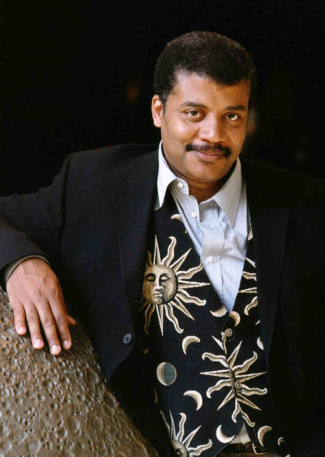 Neil deGrasse Tyson discusses the greatest obstacle he faced. Neil deGrasse Tyson discusses the greatest obstacle he faced. Tags: culture, discourse/language, knowledge, media, prejudice/discrimination, race/ethnicity, science/technology, politics of representation, symbolic representation, stereotypes, 11 to 20 mins Year: 2013 Length: 13:04 Access: YouTube Summary: In this insightful gem of a clip, Thomas Cech, president of the Howard Hughes Medical Institute, interviews world-renowned astrophysicist Neil deGrasse Tyson and asks him to recount the greatest obstacle he has faced while pursuing his career. Tyson begins by mentioning that while his parents were generally supportive of his ambitions, he couldn't necessarily count on the same enthusiasm and support from his peers, who were concerned that he apply his impressive intellect toward a profession that would allow him to advance the cause of the African American community. Specifically, Tyson recounts the story of a black Rhodes scholar in economics, who upon hearing that Tyson's chosen major was physics, replied, "The black community cannot afford the luxury of someone with your intellect to spend it on that subject." Tyson carried this nagging judgement around with him, and then while a graduate student at Columbia University, he was interviewed on air by the local news station regarding a recent explosion on the surface of the sun. Tyson explains in this clip that as he watched himself on television that evening, he realized it was the first time he had ever seen an interview with a black person that had nothing to do with being black. The clip works well as a foray into a broader discussion about what Stuart Hall calls the politics of representation, which draws attention to fact that how one imagines a people to exist in the world—how they are represented in discourse—holds consequences for the power and resources those people are able to control and wield. Neil deGrasse Tyson's story underscores Hall's thinking on the issue. Namely, "events, relations, structures do have conditions of existence and real effects, outside the sphere of the discursive; but that it is only within the discursive...[that] they can be constructed with meaning...how things are represented and the 'machineries' and regimes of representation in a culture do play a constitutive, and not merely a reflexive, after-the-event, role" (444). Thus, Tyson's answer to the Rhode's scholar is that his visible position as a black astrophysicist constitutes an important intervention in the discourse that attempts to construct black men as unqualified for the role of scientific expert. Submitted By: Lester Andrist
3 Comments
Manuel Franco
7/29/2023 02:03:03 am
I just want to say Thank You to everyone who supported me through the years. My name is Manuel Franco, New Berlin, Wisconsin. My story of how I won the Powerball lottery of $768.4M is a bit of a tale. I have been playing Powerball tickets for 6 years now since I turned 18. I bought my first ticket on my 18 birthday. I was feeling very lucky that day because I had contacted Dr. Odunga Michael to help me with the winning Powerball numbers. I really had that great great feeling that I looked at the camera wanting to wink at it. I only did a tiny part of it and trusted him. He gave me the numbers after I played a couple other tickets along with it for $10. I checked my ticket after the winnings came online and saw the numbers were correct including the Power play. I screamed for about 10 minutes because it felt like a dream. I had won $768.4M. You can check my winning testimony with the lottery officials just with my name search. Thank you Dr Odunga. Well, his email is [email protected] and you can also call or Whats-app him at +2348167159012 so you guys can contact him
Reply
mark hold
7/7/2024 03:15:28 pm
One faithful day as i was watching a video on you tube i saw a comment of one MR PAUL HAVERSACK testifying of this great herbal healer doctor Moses Buba,That helped him enlarge his manhood .i was shocked and happy, so i quickly visited his website and emailed him within 30 mins he got back to me and told me all i need to buy and i did so after 4 days i received his herbal medicine ,he gave me instructions on how to use it ,as i am speaking to you people now after using the cream for just two weeks my manhood size is 10 inches long and 8.0 girth ,,am so happy and grateful for his work in my life thank you so much Doctor Moses buba ,,i also learnt he has cure for LOW SPERM COUNT,PREMATURE EJACULATION,ERECTILE DYSFUNCTION,HIV/AIDS VIRUS,DIABETES 1/2,HERPES DISEASE,CANCER,and lots more
Reply
Leave a Reply. |
Tags
All
.
Got any videos?
Are you finding useful videos for your classes? Do you have good videos you use in your own classes? Please consider submitting your videos here and helping us build our database!
|
 RSS Feed
RSS Feed
